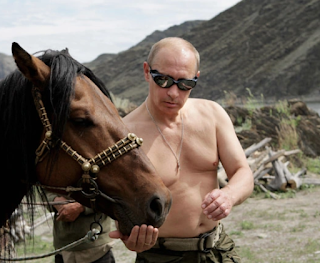This past Sunday, May 15, 2022, an article appeared in the Washington Post that cast some light on the beliefs and antics of Russian Dictator Vladimir Putin, “The Far-Right Mystical Writer Who Helped Shape Putin’s View of Russia” (p. B-4). It was written by Tara Isabella Burton, author of Strange Rites (2020), a book which examines the odd turns that religion has taken in the United States, especially under the influence of what Pope Gregory XVI in 1834 called rerum novarum, “New Things,” today better known as socialism, modernism, and the New Age.
 |
| The "Great Awakening" to Save America from Itself |
Burton’s Strange Rites is an example of a subgenre of social criticism that attempts to explain what appears to be the devolution of religion in America. Other notable examples are J.D. Dickey’s American Demagogue (2019), Chris Jennings’s Paradise Now (2016), and Adam Morris’s American Messiahs (2019).
While the noted books and many others in the subgenre make valuable contributions to understanding the decay of religion, all manage to make the same mistake or, more accurately, make the same incorrect assumption. This is that religion begins not with reason, but with faith. This leads inevitably to the conclusion that religion qua religion is not based on knowledge, i.e., that which is necessarily true, but on opinion, which is not necessarily true.
 |
| Organized religion in the popular mind |
That being the case, organized religion is widely understood, especially in America, as a means by which one individual or group imposes its views on others by force, actively or by implicit threat. Might makes right, and the Devil take the hindmost. It should therefore come as no surprise that increasing numbers of people in America and elsewhere reject institutional religion in all its forms, both Christian and non-Christian, with the more traditional forms of Catholicism being particularly singled out — with an important caveat explained below.
That does not mean that people are rejecting religion per se. Rather they are rejecting institutional religion that they believe to be a means by which some people force their opinions on others. As the working assumption is that there are no absolutes (at least in religion), this is simple tyranny, fascism, rightwing conspiracy, or whatever you want to call it. This, by the way, also explains how a supremely leftist movement like National Socialism (Nazism) came to be labeled “rightwing.”
 |
| The Kingdom of God on Earth |
Thus, many of the “nones” or “unchurched” tend to exhibit a great interest in something they call social justice (ironic, as true social justice is inherently institutional), as it works for concrete results regarding material betterment that seems to be based on facts and reason. They avoid organized religion’s “Pie in the Sky” promises about an afterlife as a reward if we hold the right opinions about something.
Not surprisingly, however, the effort to establish and maintain a “Kingdom of God on Earth,” the “consistently recurring objective of American messianic movements” (Adam Morris, American Messiahs: False Prophets of a Damned Nation (New York: W.W. Norton and Company, 2019), 6–7, 256), has been the hallmark of adherents of the “New Things” since Day One of human history. As history has shown, the belief has frequently been taken as justifying imposing the perfect world on others by force if they fail to go along with it voluntarily. As Fulton Sheen remarked, the seemingly inevitable result of efforts to create a Heaven on Earth is a living hell. (Fulton J. Sheen, Philosophies at War (New York: Charles Scribner and Sons, 1943), 94–95.)
 |
| Msgr. Ronald A. Knox |
Consequently, Burton concludes Strange Rites by declaring, “we do not live in a godless world . . . we live in profoundly anti-institutional one, where the proliferation of Internet creative culture and consumer capitalism have rendered us all simultaneously parishioner, high priest, and deity. America is not secular but simply spiritually self-focused.”
Contrary to Burton’s assertion that anti-institutionalism is a recent phenomenon, derived from “the proliferation of Internet creative culture and consumer capitalism,” it has been going on since the dawn of history, something that Msgr. Ronald Knox called enthusiasm or ultrasupernaturalism. Knox defined enthusiasm as an excess of charity that causes disunity, for it neglects reason and “man’s miserable intellect,” replacing reason based on empirical observation and logical consistency with faith based on something vaguely called “love,” which inevitably ends up meaning whatever someone wants it to mean — usually "might makes right."
What Burton and the other commentators fail to take into account is the fact that religion is not ultimately based on faith, but on reason, albeit reason guided and illuminated by faith. Particularly in the Catholic Church as well as other sects, faiths and philosophies that are Aristotelian in some degree, knowledge of God’s existence and of the natural law may be known by human reason alone. The Catholic Church, in fact, considers this such an important doctrine that it has declared it to be infallibly true. As it says in Canon 2.1 of the First Vatican Council, “If anyone says that the one, true God, our creator and lord, cannot be known with certainty from the things that have been made, by the natural light of human
 |
| Well . . . there isn't one . . . |
reason: let him be anathema.” This is reiterated in the first article of the “Oath Against Modernism” and § 2 of Humani Generis: “Absolutely speaking, knowledge of God’s existence and of the natural law written in the hearts of all men may be known by the force and light of human reason alone.”
Now, that doesn’t say that God’s existence has been proven, only that it can be. Even the most fanatical Catholic could reject a specific proof of God’s existence and still be considered in “good standing.” In matters that are not purely faith or morals, the Catholic Church gives general norms only. That is why if someone comes prating that a specific economic or political program is the only acceptable Catholic program instead of “merely” being in material conformity with the principles that the Catholic Church teaches, he or she is profoundly wrong, and the same goes for many other faiths and philosophies.
 |
| Not a good fit. |
So, what has this got to do with Vladimir Putin and his “Holy Crusade” to save Christendom by invading and conquering Ukraine?
Everything.
As explained in more detail in our recent book, The Greater Reset, within the faith-based framework of the “New Things,” individual sovereignty of the human person created by God is pushed aside or ignored. Instead, the theory is that sovereignty resides in an idea created by human beings, whether an individual or a small élite somehow better than the rest of us, or humanity as a whole, that is, the collective. This inverts the order of creation, putting a human creation on top, and God at the bottom, with ordinary mortals stuck in the middle, dependent on the “great leader” or führer, the political, social, or economic élite, or on the collective . . . conveniently controlled by the “great leader” or führer, the political, social, or economic élite.
Ordinary people become stripped of power over their own lives, and in many cases begin believing that there is only one way to effect beneficial social, political, or economic change. That is to get rid of the obvious criminals, Nazis, fascists, reactionaries, radicals, conservatives, liberals, gays, straights, racists, etc., etc., etc., who are obviously ruining lives and the world for their personal fun and profit. This will allow right-thinking people to put in a new leader or élite who will hunt down and punish or eliminate everyone with whom right-thinking people disagree and establish and maintain the Kingdom of God on Earth of the right sort, not the obviously perverted version of the other guys.
 |
| "HEY! What about MY 'Third Rome'?" |
This explains why otherwise rational people, particularly Evangelical Christians and conservative or traditionalist Catholics, support Putin, or at least remain silent in the face of what can only be described as crimes against humanity — not excepting what he is doing to his own people. Not understanding the act of social justice and the essential characteristic that each and every human being has a direct and personal responsibility for the whole of the common good (not as overwhelming as it sounds once you do understand social justice), such well-intentioned people assume as a given that only a very strong and powerful individual who has the right vision can restore the social order to its proper foundations and give people the chance to lead a decent, Christian life in a well-ordered society that doesn’t allow all the (other) perverts to run things. Thus, as Burton explained in her article, Putin
. . . invoke[es] the idea of a religiously tinged civilizational clash: Eurasia against the West. For Putin, Moscow is the “third Rome,” the spiritual and cultural inheritor of the legacy of the Roman and Byzantine empires, the center of a distinctly anti-European dominion one powerful (and authoritarian) enough to withstand the perceived threats of liberal modernity, multiculturalism and progressive values.
 |
| Putin being too sexy for a shirt. |
Now, as we see in the analysis contained in The Greater Reset (and if we know even a little history), Putin has some . . . we’ll call them interesting ideas. Many of them bear a strong resemblance to the Nazism he claims to fear, and are certainly opposed to a traditional understanding of Christianity, Catholic, Orthodox, or Protestant, to say nothing of the Aristotelian concept of natural law as based on reason.
That is why we say that, if people understood the act of social justice, Putin would not only not have been able to start his war, he would very likely never have become dictator of Russia. We can also say that if Catholics and other Christians, as well as people of all other faiths and philosophies, understood social justice, they would never for one moment tolerate, much less enthusiastically support, a madman like Putin.
We are not using “madman” as a pejorative. As we will see in the next posting on this subject, Putin’s worldview is not connected with reality, nor does he behave rationally by any measure, even that of his own twisted vision of the world.
#30#
